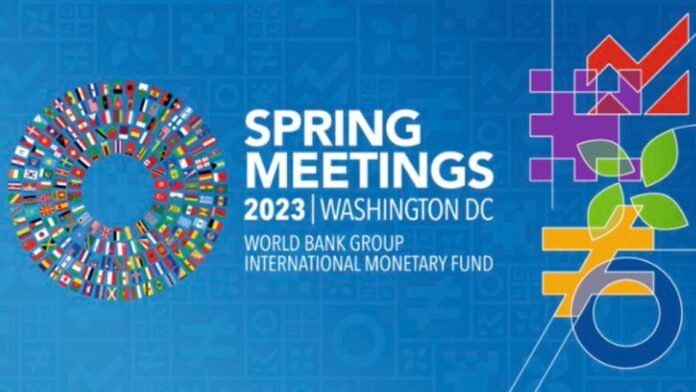By: Staff Writer
Colombo (LNW):Sri Lanka for the first time under the dictates of Washington based International Monetary Fund (IMF) after the declaring of preemptive debt default for the first time is participating the 2023 Annual and Spring Meetings of the International Monetary Fund (IMF) and the World Bank Group from 10-16.
These meetings each year bring together central bankers, ministers of finance and development, private sector executives, civil society representatives, and academics to discuss the state of the global economy and issues of international concern, such as the growth outlook, financial stability, and poverty reduction.
The Meetings are the only gathering of its kind in the world and a unique forum for discussion on economic policymaking.
During Annual and Spring Meetings, Governors and country officials hold bilateral meetings with the staff and management of the IMF and World Bank.
Sri Lanka will be represented by State Minister of Finance Shehan Semasinghe, CB Governor Nandalal Weerasinghe and Finance Ministry Secretary Mahinda Siriwardena.
This year’s Spring Meetings come as political pressure ramps up for the global financial system to evolve to tackle the development and climate crisis at hand.
On the eve of IMF Spring Meetings and the country’s ongoing grapple to restructure massive external and internal debt with the first tranche of the international lender’s US$ 3 billion in hand, one of the first comments on the whole affair was made by Former Central Bank Governor Ajith Nivard Cabraal.
Sri Lanka’s economy is being controlled from Washington, Sri Lanka’s Former Central Bank Governor said recently.
Noting that he read 151 pages of the IMF report on Sri Lanka’s Extended Fund Facility, Cabraal claimed that it would not be easy for Sri Lanka to meet the conditions imposed by the global lender.
The Central Bank Governor and the leaders of the country must be mindful to work and not complain, former Central Bank Governor Ajith Nivard Cabraal said, adding that he has handled this job for the last nine years working for the country without making grumbles.
During his tenure Sri Lanka was servicing debt without any default even during the period of war and the economic crisis from 15 September 2021 till March 2022. The crisis started in 2019 during the tenure of W.D. Lakshman.
Cabraal’s comments carries validity as the country is attending spring meetings without any bargaining power as the country’s image has fallen to the low level of debt defaulter and it is compelled to oblige the Global lenders 48 bench marks and 9 prior actions.
On top of it, Sri Lanka has to face the pressure of its foreign and domestic creditors and that is why it is incomprehensible for taking a hasty decision to announce the sudden “debt default” and non- payment of all forex debt and interest (including the July 2022 USD 1,000 mn International Sovereign Bonds ISB) from 12th April 2022 onwards, and thereby risk major adverse consequences, together with a massive “cross-default” as well.
The IMF can play a vital role in supporting fragile economies that are increasingly at risk from climate change, and provided hope for many during the Covid crisis, injecting liquidity into the global system, and setting up the Resilience and Sustainability Trust.
But the medicine prescribed for the country’s ailing economy is very difficult to swallow. The Spring Meetings are a chance to drive some urgent changes in how the World Bank and IMF evolve, shaping the global consensus for reform to accelerate this evolution.
In fact, Sri Lanka has been on IMF intensive care almost continuously since 1965 but not a single previous IMF program has not been able to cure the country’s ailing economy fully .This is the 17th time under IMF life support, hope for the best.

